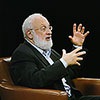Finding The Wisdom “Hidden” In Kabbalah
 When we read The Zohar, we need to connect everything there is into one reality that already exists within our soul. The soul is what we call the Malchut of the World of Infinity (Atzilut), meaning all the worlds incorporated together, “I” or “the whole world and I.” All that belongs to my soul since my soul is a tool of perception.
When we read The Zohar, we need to connect everything there is into one reality that already exists within our soul. The soul is what we call the Malchut of the World of Infinity (Atzilut), meaning all the worlds incorporated together, “I” or “the whole world and I.” All that belongs to my soul since my soul is a tool of perception.
Who is the Creator? It is the inner power that acts within my soul; it is the reason for my existence, the cause that forces me to pursue revelation of the universe and the Creator as the source of my life.
The Zohar tells us about the soul and its various parts as well as the states and processes it goes through. Because of my desire to learn more about the soul’s states and processes, the soul is revealed; I find the tools of perception with which I feel the actual world I live in, but which has, thus far, been concealed from me. Kabbalah is called a “hidden” wisdom since it is the study of the concealed world and the process to reveal it.
In addition to the study of Kabbalah, the group is given to us to help us disclose this world. The parts of reality which I call the “Kabbalah group” or my “fellow-group-mates” can help me with this task. They are the active parts of reality, the only active parts of reality. I can feel the group and want to connect them with me. Together with them, I can work to bring them closer to me.
I can’t work with the rest of reality this way because I don’t sense the same kind of feedback that I can get from the group. These active parts of reality are given to me by the Creator so that by working through them I can bring myself closer to the rest of reality as parts of my own soul.







